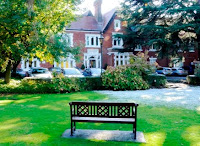 Epping Forest District Council has launched a public consultation to gather views on how the executive governance of the Council should be structured in the future posing the question: ‘Should EFDC be run by a Leader of a Mayor’.
Epping Forest District Council has launched a public consultation to gather views on how the executive governance of the Council should be structured in the future posing the question: ‘Should EFDC be run by a Leader of a Mayor’.Under the Local Government and Public Involvement in Health Act 2007 all Councils with a Leader and Cabinet have to consult on executive arrangements. Although the new Coalition Government has said it intends to repeal this law at some point (letter here from Rt. Hon. Grant Shapps MP), Councils still need to comply with the current Act and carry out this consultation.
the current Act and carry out this consultation.
Ian Willett, Assistant to the Chief Executive at Epping Forest District Council, said: "The main difference in the options is how the head of the Council is elected. Under the current system of Leader and Cabinet, the Leader is appointed by Councillors. A Mayor would be directly elected by residents of the district. Councillors are able to remove the Leader from Office whereas a Mayor could only be removed by residents at elections every four years, unless they resign or become disqualified."
The options are:
Op tion 1 - Leader and Cabinet: The leader is elected by the District Councillors. They serve up to four years unless they cease to be a Councillor or are removed as leader by a resolution of the Council. The Leader appoints up to nine Councillors to the Cabinet. He or she decides which areas of responsibility (portfolios) each member of the Cabinet will hold. The Leader can sack members of the Cabinet or change their portfolios at any time. The Leader can delegate some or all of their powers to the Cabinet, Committees, individual Councillors or Council Officers.
tion 1 - Leader and Cabinet: The leader is elected by the District Councillors. They serve up to four years unless they cease to be a Councillor or are removed as leader by a resolution of the Council. The Leader appoints up to nine Councillors to the Cabinet. He or she decides which areas of responsibility (portfolios) each member of the Cabinet will hold. The Leader can sack members of the Cabinet or change their portfolios at any time. The Leader can delegate some or all of their powers to the Cabinet, Committees, individual Councillors or Council Officers.
Option 2 - Elected Mayor and Cabinet: Residents vote to decide who  should be elected as Mayor to run the Council. The Mayor is elected for four years unless they resign or become disqualified. Candidates do not need to be Councillors but if a serving District Councillor is elected as Mayor their seat on the Council automatically becomes vacant. The Mayor holds a range of powers (except for those reserved to the Council by its constitution). She or he can appoint between two and nine Councillors to a Cabinet and decides what, if any, executive powers they will exercise. The Mayor can sack any member of the Cabinet at any time and appoint a replacement. The Mayor appoints one member of the Cabinet as Deputy Mayor. That person exercise the powers of the Mayor in his or her absence or if he or she no longer holds Office. The Mayor drafts the Council budget which can only be overturned by a two thirds majority of the Council.
should be elected as Mayor to run the Council. The Mayor is elected for four years unless they resign or become disqualified. Candidates do not need to be Councillors but if a serving District Councillor is elected as Mayor their seat on the Council automatically becomes vacant. The Mayor holds a range of powers (except for those reserved to the Council by its constitution). She or he can appoint between two and nine Councillors to a Cabinet and decides what, if any, executive powers they will exercise. The Mayor can sack any member of the Cabinet at any time and appoint a replacement. The Mayor appoints one member of the Cabinet as Deputy Mayor. That person exercise the powers of the Mayor in his or her absence or if he or she no longer holds Office. The Mayor drafts the Council budget which can only be overturned by a two thirds majority of the Council.
The online consultation is a quick and easy way for you to tell EFDC your views. Paper questionnaires are also available as they want to encourage as many residents as possible to take part. If you live or work in the Epping Forest district, you can complete the consultation online here or alternatively, click here to download a paper copy of the response form.
 Essex County Council is offering local residents who wish to improve their computer skills an opportunity to take a class at Epping Library on Thursday 23 February 2012, from 2pm to 4pm.
Essex County Council is offering local residents who wish to improve their computer skills an opportunity to take a class at Epping Library on Thursday 23 February 2012, from 2pm to 4pm.








































